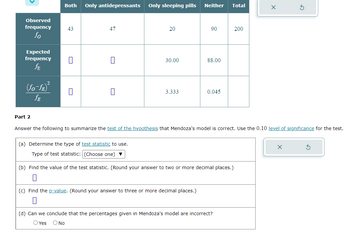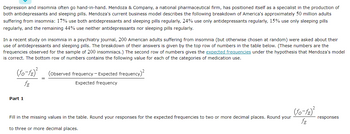Depression and insomnia often go hand-in-hand, and sometimes it is unclear which of the two should be the primary subject of treatment in individuals suffering from insomnia. Mendoza & Company, a national pharmaceutical firm, has positioned itself as a specialist in the production of both antidepressants and sleeping pills. Mendoza's current business model describes the following breakdown of America's approximately 50 million adults suffering from insomnia: 17% use both antidepressants and sleeping pills regularly, 24% use only antidepressants regularly, 15% use only sleeping pills regularly, and the remaining 44% use neither antidepressants nor sleeping pills regularly. A recent issue of the psychiatry journal Patterns contains a study on insomnia. In the study, 200 American adults suffering from insomnia (but otherwise chosen at random) were asked about their use of antidepressants and sleeping pills. The breakdown of their answers is given by the top row of numbers in the table below. (These numbers are the frequencies observed for the sample of 200 insomniacs.) The second row of numbers gives the expected frequenciesunder the hypothesis that Mendoza's model is correct. The bottom row of numbers contains the following value for each of the categories of medication use. −fOfE2 fE = −Observed frequencyExpected frequency2 Expected frequency Part 1 Fill in the missing values in the table. Round your responses for the expected frequencies to two or more decimal places. Round your −fOfE2fE responses to three or more decimal places. Send data to Excel Both Only antidepressants Only sleeping pills Neither Total Observed frequency fO fO 40 fO 46 fO 23 fO 91 200 Expected frequency fE fE fE fE 30.00 fE 88.00 −fOfE2fE −fOfE2fE −fOfE2fE −fOfE2fE 1.633 −fOfE2fE 0.102 Part 2 Answer the following to summarize the test of the hypothesis that Mendoza's model is correct. Use the 0.05 level of significance for the test. (a) Determine the type of test statistic to use. Type of test statistic: ▼(Choose one) (b) Find the value of the test statistic. (Round your answer to two or more decimal places.) (c) Find the critical value. (Round your answer to two or more decimal places.) (d)Can we conclude that the percentages given in Mendoza's model are incorrect? Yes No
Depression and insomnia often go hand-in-hand, and sometimes it is unclear which of the two should be the primary subject of treatment in individuals suffering from insomnia. Mendoza & Company, a national pharmaceutical firm, has positioned itself as a specialist in the production of both antidepressants and sleeping pills. Mendoza's current business model describes the following breakdown of America's approximately
million adults suffering from insomnia:
use both antidepressants and sleeping pills regularly,
use only antidepressants regularly,
use only sleeping pills regularly, and the remaining
use neither antidepressants nor sleeping pills regularly.
A recent issue of the psychiatry journal Patterns contains a study on insomnia. In the study,
American adults suffering from insomnia (but otherwise chosen at random) were asked about their use of antidepressants and sleeping pills. The breakdown of their answers is given by the top row of numbers in the table below. (These numbers are the frequencies observed for the sample of
insomniacs.) The second row of numbers gives the expected frequenciesunder the hypothesis that Mendoza's model is correct. The bottom row of numbers contains the following value for each of the categories of medication use.
|
|
Part 1
Fill in the missing values in the table. Round your responses for the expected frequencies to two or more decimal places. Round your
responses to three or more decimal places.
|
|
Part 2
Answer the following to summarize the test of the hypothesis that Mendoza's model is correct. Use the
level of significance for the test.
|
|
Trending now
This is a popular solution!
Step by step
Solved in 2 steps











